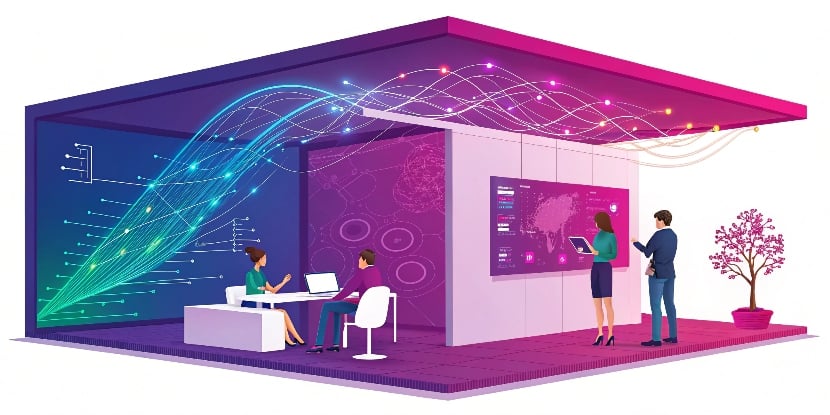Top 5 AI Trends Shaping 2025: How AI is Redefining Industries
As we approach 2025, AI is rapidly transforming industries. In this post, we'll explore five key trends—from autonomous agents to cost-saving models and advanced generative AI—that are reshaping how businesses innovate and operate. Let's dive in!
1. Autonomous Agents: The Next Generation of AI Assistants
Autonomous AI agents are emerging as a game changer in how tasks are managed and executed. These advanced systems are capable of performing complex, multi-step operations with little human intervention. For instance, platforms like AutoGen, CrewAI, and LangChain are democratizing the AI agent building process by offering templates, tools, and frameworks for developers and non-developers alike. Industries ranging from retail to customer service are already experimenting with these technologies, setting the stage for a future where AI becomes an indispensable co-worker.
Example: Google's Project Astra is an advanced AI agent developed by DeepMind, designed to seamlessly integrate into daily life through multimodal capabilities, processing and responding to diverse inputs like text, images, videos, and audio.Project Astra
2. Cost-Deflationary Models: Democratizing AI Access
One of the most transformative trends in AI is the rapid reduction in operational costs. Innovations from startups such as DeepSeek are demonstrating how cost-deflationary models can drive down token prices and reduce the expenses associated with training and deploying large language models. This trend not only lowers the barrier to entry for smaller players but also enables established companies to scale their AI initiatives more economically. Companies like Mobius Labs Mobius Labs are pioneering methods to reduce AI costs by using less computing power, making AI more accessible and sustainable.
3. Evolution of Generative AI: From Wrappers to Standalone Powerhouses
Generative AI has made headlines in recent years, largely through applications like ChatGPT and Midjourney. However, 2025 is set to mark the transition from simple “wrapper” applications—tools that merely enhance existing processes—to fully-fledged, value-adding AI products. New generation models are now capable of not only generating content but also understanding context and integrating seamlessly into business workflows. This evolution is enabling industries to move beyond mere automation, using generative AI to create tailored marketing materials, design prototypes, and even assist in strategic decision-making.
4. AI as a Productivity Booster: Augmenting Human Capabilities
Rather than replacing human workers, the current wave of AI innovations is focused on augmenting human capabilities. Companies are increasingly adopting AI tools that serve as “co-pilots” in everyday tasks—automating repetitive functions while freeing up employees to focus on high-value activities. Real-world examples include businesses like Grind The Grind, where AI assists with marketing, customer service, and data analytics, resulting in noticeable productivity gains without sacrificing the human touch. Autonomous robots and vehicles are also being integrated into workflows, enhancing efficiency and precision in sectors like logistics and transportation.
5. AI-Accelerated R&D: Driving Innovation and Reducing Time-to-Market
In research and development, AI is accelerating the pace of innovation like never before. Advanced AI tools are now being used to simulate, prototype, and iterate product designs at speeds far exceeding traditional methods. This trend is particularly evident in sectors where rapid innovation is critical to staying ahead of market trends. AI not only cuts down on engineering hours but also improves product performance by enabling more precise and data-driven design decisions. Additionally, AI agents are being used in climate modeling and drug discovery, leveraging quantum simulations to speed up research processes.
Conclusion
The AI landscape in 2025 is set to be defined by these five transformative trends. Autonomous agents will streamline operations, cost-deflationary models will democratize access to powerful AI tools, and the evolution of generative AI will push the boundaries of creativity and productivity. Moreover, AI's role in boosting workplace efficiency and accelerating R&D is set to redefine industry standards and drive unprecedented innovation. As these trends continue to unfold, businesses that embrace and adapt to these changes will be well-positioned to lead in an increasingly competitive market. The future of AI is not just about technology—it's about reshaping how we work, innovate, and grow.
Ready to Embrace the Future of AI?
Want to learn more about these transformative AI trends and how they can benefit your business? Explore our blog for deeper insights, or reach out to discuss how we can help you navigate the evolving AI landscape.
Related Articles

AI Integration Roadmap for Small Businesses
Discover the ultimate step-by-step AI integration roadmap for small businesses. Learn how to assess your needs, select the right tools, pilot projects, integrate AI into daily operations, and continuously optimize for growth and efficiency.

How AI is Reshaping Software Development
Explore how AI is revolutionizing software development, from automating tedious tasks to enhancing decision-making. Learn how developers can best utilize AI-powered tools to improve efficiency, scalability, and innovation.